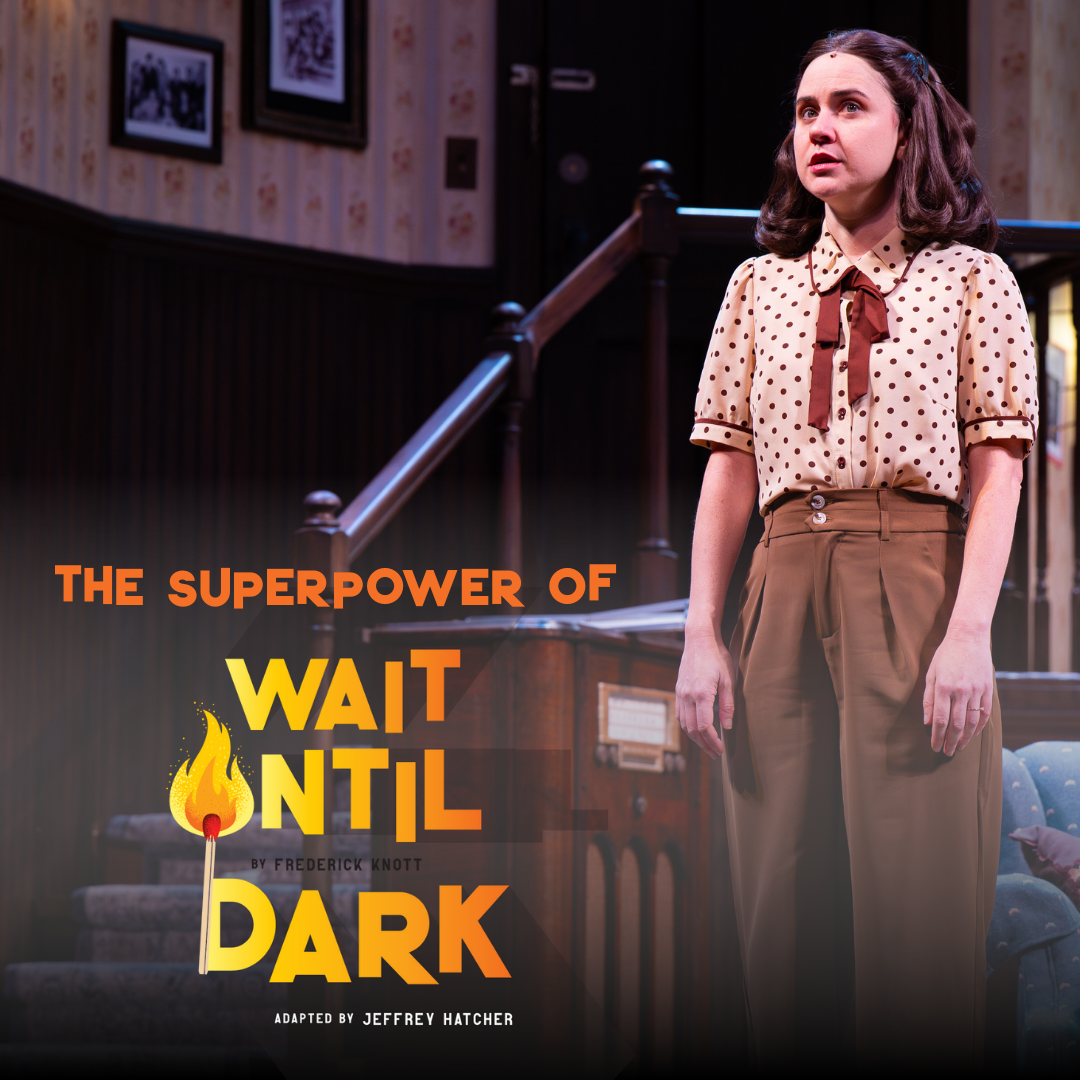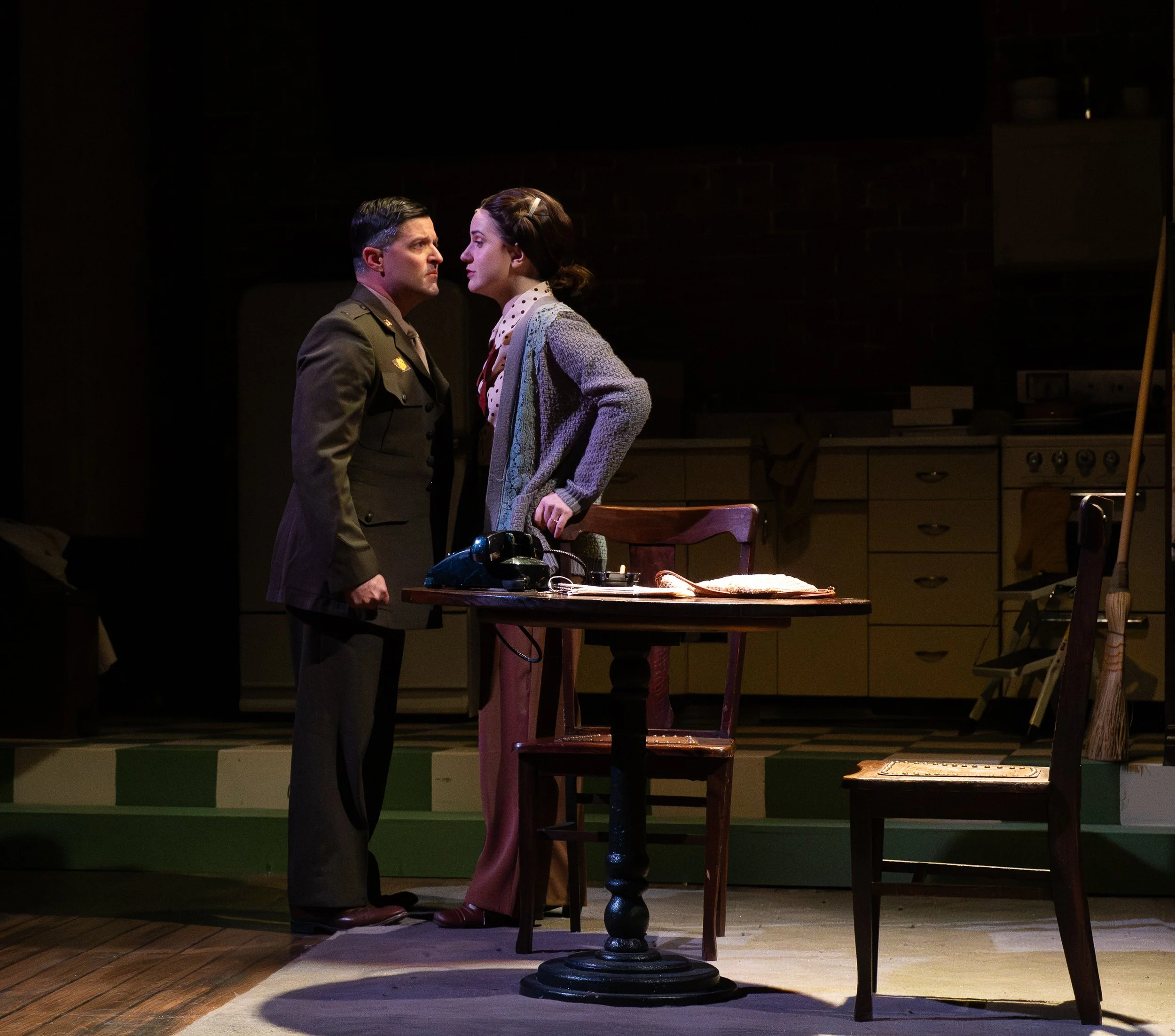“Starting is always a difficult thing, in any walk in life, but with a play, it looks like this giant mountain to climb. But when you arrive, and as soon as the actors sit at the table… and you hear their voices, and hear the energy, you can start to already see it coming into view…” says acclaimed director and playwright, Mark Shanahan, who is in Norfolk to direct the latest Virginia Stage Company production of season 47, “Wait Until Dark.” We’re inside the side lobby of the Wells Theatre…
Review: Share a killer, thriller, chiller night with Virginia Stage Company
In ‘Wait Until Dark,’ our heroine can’t see the con men who come to rob her. Page Laws reviews this remake of a 1960s classic.
“Why do I have to be the world’s champion blind woman?”
— Susan to Sam in “Wait Until Dark”
___
How appropriate for the weather! A thriller that further chills us, its poor paying audience, to the very bone …
Wait Until Dark Brings Live Suspense to Coast Live
Wait Until Dark Takes the Spotlight on The Hampton Roads Show
Scrooge and Sherlock on Coast Live
Holiday Mischief on Morning TV: VSC Visits The Hampton Roads Show
Stand Up For The Arts!
In the late evening of May 2, 2025, Virginia
Stage Company received word that the National Endowment for the Arts (NEA) was withdrawing a $15,000 grant that had been awarded to us to support performances of the mental health-focused play, Every Brilliant Thing, for high school audiences. The NEA’s email explained that our program does not align with new funding priorities, intended to “reflect the nation's rich artistic heritage and creativity as prioritized by the President.”
The Virginian-Pilot: Arts and culture in South Hampton Roads fuel $270 million economic engine, study says
The Virginia Stage Co. presented a four-week run of “Fiddler on the Roof” in October. John Payonk played Tevye and Velkassem Agguini played The Fiddler. The production was the theater’s highest-selling play in its 45-year history. (Courtesy of Sam Flint)
The arts made a huge economic impact on South Hampton Roads in 2022 — to the tune of $270 million, according to a recent study.
The nonprofit arts and culture sector in South Hampton Roads created $140 million from organizations and another $130 million from event-related audience expenditures, according to the “Arts & Economic Prosperity 6,” the sixth in a series of national studies conducted by Americans for the Arts based in Washington, D.C.
The sector supported nearly 5,000 jobs and produced $52 million in local, state and federal government revenue last year, according to the economic and social impact study.
“This research demonstrates that the arts and culture sector is a powerful economic engine, contributing significantly to job creation, tourism and the overall economic vitality of South Hampton Roads,” said Lisa Wigginton, executive director of the region’s Arts Alliance nonprofit.
The study showed that the typical attendee in South Hampton Roads spends on average $35.73 per event aside from ticket admission. Those dollars go to local restaurants, retail stores, parking, hotels and more.
“This is the thing about the arts — they boost other businesses,” Wigginton said. “Not only do the arts enrich our lives, providing a source of inspiration, but they also play a pivotal role in driving our local economy.”
The Alliance, started in 1987, aims to foster a strong, vibrant and inclusive community through arts leadership, advocacy, services and support.
The study included 372 other regions across the U.S. that Wigginton said enables Arts Alliance to compare results, gather more data, determine best practices, spread the word more effectively and strengthen support for arts organizations, individual artists and the area’s creative culture in general.
Participating organizations for the study of South Hampton Roads included a multitude of nonprofits and cultural organizations such as the Virginia Aquarium & Marine Science Center, Norfolk Botanical Garden and the Virginia Zoo. Out of 158 eligible organizations, 85 participated from Portsmouth, Chesapeake, Suffolk, Virginia Beach and Norfolk and Franklin, Isle of Wight and Southampton counties by submitting surveys and were collected from 802 audience members. The surveys were collected from May 2022 to June 2023.
Tom Quaintance, Virginia Stage Co.’s producing artistic director, said the study results are a great example of how the arts mean business.
“It’s a study that shows how much the arts can benefit a community both in the way in which we add to the cultural life, but also the financial life,” he said.
A four-week run of “Fiddler on the Roof” in October at the Wells Theatre in downtown Norfolk was the highest-selling show in the Virginia Stage Co.’s 45-year history, Quaintance said.
He pointed out that the number of people involved in the behind-the-scenes six-month process leading up to the production outnumbers the people on stage.
“We are driving the economy, not just on performance day, but around all the productions,” he said.
Quaintance also said audiences came out in force for the opportunity to experience something together that can’t be achieved other than at a live performing arts event, especially in light of the post-pandemic world focused on the importance of communal gathering.
The study also showed that 17% of event attendees were from outside the city or county of the event. On average, they spent close to $50 at local businesses.
Additional figures showed that 90% of survey respondents saw the event or venue as a source of pride for the community and 86% said they would feel a sense of loss if the activity or venue was no longer available.
Nolen V. Bivens, president and CEO of Americans for the Arts, said in a news release that arts and culture organizations produce authentic cultural experiences that are magnets for visitors, tourists and new residents.
“When we invest in nonprofit arts and culture, we strengthen our economy and build more livable communities,” Bivens said.
By SANDRA J. PENNECKE | sandra.pennecke@pilotonline.com | Staff writer








